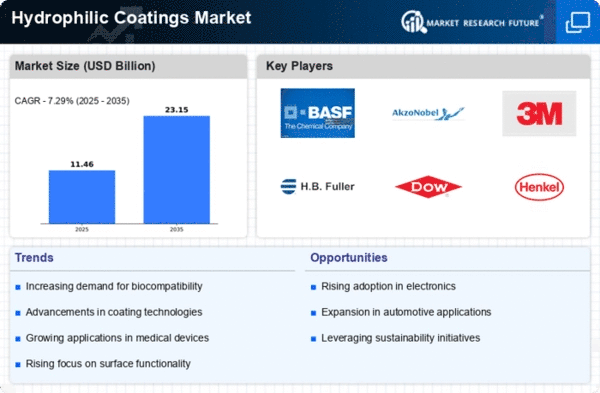Top Industry Leaders in the Hydrophilic Coatings Market

The hydrophilic coatings market, a niche yet vibrant corner of the broader coatings industry, is experiencing a surge of growth. These unique coatings, designed to attract and retain water, are finding new applications across diverse sectors, from medical devices to textiles to the automotive industry. Understanding the competitive landscape of this dynamic market is key for businesses aiming to capitalize on its promising potential.
Giants and Innovators: Strategies Shaping the Market:
-
Diversification Playbook: Industry leaders like P2C Technologies and SolGel are expanding their portfolios beyond traditional applications, venturing into high-growth segments like healthcare and wearable technology. P2C's recent development of an anti-fogging hydrophilic coating for eyeglasses exemplifies this trend. -
Technology Thrust: R&D is paramount, with players like Nanoco Technologies and Advanced Surface Technologies actively investing in novel coating materials and deposition techniques to improve performance and cost-effectiveness. Nanoco's development of superhydrophilic coatings with self-cleaning properties highlights this focus on innovation. -
Strategic Alliances: Collaboration is fostering growth, with companies like Aculon and Fraunhofer Gesellschaft partnering with academic institutions and research laboratories to accelerate innovation and access specialized expertise. Aculon's collaboration with MIT to develop biocompatible hydrophilic coatings for medical devices is a prime example. -
Sustainability Focus: Eco-friendly solutions are gaining traction, with players like AkzoNobel and PPG Industries developing bio-based hydrophilic coatings or employing sustainable synthesis processes to minimize environmental impact. AkzoNobel's launch of a plant-based hydrophilic coating for textiles showcases this commitment to green solutions.
Factors Dictating Market Share:
-
Product Portfolio Breadth: Companies offering a diverse range of hydrophilic coatings tailored to specific applications and industries gain a competitive edge. SolGel's extensive portfolio catering to different substrates and functionalities exemplifies this strategy. -
Technological Prowess: Superior coating performance, such as faster water absorption, longer durability, or additional functionalities like self-cleaning, provide a significant advantage. Nanoco's superhydrophilic coatings with exceptional water repellency demonstrate this focus on cutting-edge technology. -
Regulatory Landscape: Adapting to regulatory requirements, especially in sensitive sectors like healthcare, is crucial for market access. Aculon's biocompatible coatings complying with stringent medical device regulations showcase this compliance-driven approach. -
Sustainability Credentials: Green solutions resonate with environmentally conscious consumers and businesses, offering a market advantage. AkzoNobel's bio-based and low-VOC hydrophilic coatings for textiles highlight this green focus.
Key Players:
Hydromer Inc. (U.S.), Abbott (U.S.), Corning Incorporated (U.S.), Harland Medical Systems (U.S.), Surmodics, Inc. (U.S.), DSM (Netherlands), Biocoat Incorporated (U.S.), Aculon (U.S.), AST Products, Inc. (U.S.), and AdvanSource Biomaterials Corp (U.S.).
Recent Developments:
In September 2021, Biocoat, Inc., a specialty provider of hydrophilic biomaterial coatings for medical devices, announced that it had expanded its on-site ISO-certified, full-service agreement coating service unit to include the ability to treat interventional medical devices with ultraviolet (UV) light, as well as the ability to plasma treat them. The news coincides with the company's 30th anniversary of outstanding coating service. In 2021 November, Transcontinental Advanced Coatings is pleased to announce the launch of the Total Care product line, which includes medical antimicrobial hard coatings, patient monitoring devices, ostomy devices, advanced wound care dressings, IV, and consumer & beauty dressings.
Biocoat announced its expanded business offering of hydrophilic dip coating equipment development, design and delivery in April 2022. Biocoat’s EMERSE line of equipment is available to businesses looking for an internal dip-coating system to complete the production of their medical devices.
Harland Medical came up with a method for measuring the thickness of coatings on medical devices in April 2022. Harland Medical Systems will be at MD&M West, where they will introduce CTS1100 Coating Thickness Testing System. The CTS1100 test system allows manufacturers of medical apparatuses to determine easily and precisely their product’s coating thickness.










